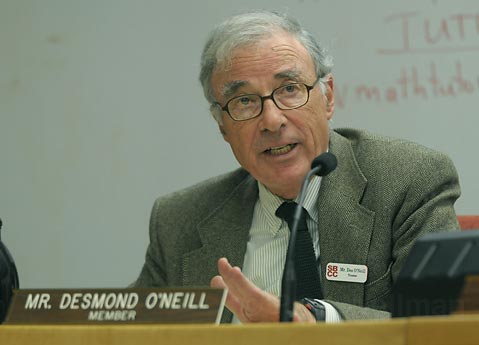Budget Blues in Double C-Flat
Adult Ed Severs Ties with ‘Monday Madness’ Jazz Band
Administrators at Santa Barbara City College have cut the ties between four popular, high-profile music performance programs — including the Monday Madness Big Band, the Concert Choir, the Symphony Orchestra, and the Concert Band — and the college’s embattled adult education program. City College President Andreea Serban cited tougher new guidelines issued by the state chancellor of community colleges governing reimbursement for such classes. Some of these programs have been around for 30 years; all have been part of Continuing Education (a k a Adult Ed) since 1994. Serban said three will be run via the school’s for-credit curriculum beginning this fall. The fourth, the Monday Madness big-band class, will be subsidized by the college through the fall semester, she said, then transferred into the for-credit curriculum. A class that used to cost $12 per student will now cost roughly $70. But people who don’t wish to take the class for credit, she said, will be allowed to enroll as volunteers. “I understand some folks have their doubts, but the rules are very clear,” Serban said.

For John Clark, chair of the music department for the past five years, the new rules are anything but clear. In fact, he said, he and college dean Alice Scharper have spent hours “poring over the state guidelines” and have yet to find where it says these long-standing music programs can no longer receive state reimbursement under the rubric of Continuing Ed. The administration has claimed that because for-credit students and Continuing Education students alike are allowed to participate in these performance classes, state administrators have decreed they will no longer reimburse community colleges for students enrolled via Continuing Ed. “We asked them to show us the exact language where it says that,” said Clark. “We said, ‘Show me the sentence.’ They can’t.”
Ofelia Arellano, Continuing Ed vice president, expressed her own bewilderment over Clark’s confusion. She insisted that she explained to Clark and Scharper that the state chancellor’s office notified her that Monday Madness could not qualify for state reimbursement because the course description does not detail how Monday Madness instructor — and conductor — Ike Jenkins could meet the instructional needs of his younger students while also addressing the same needs for his older students. The class, she stressed, had to be geared for older adults to qualify for Continuing Education funding.
“It’s not really the difference between $12 and $70,” he said. “For a lot of the players, it’s almost like a slap in the face.”
But for Ike Jenkins, the issue has more to do with respect than financial hardship. “It’s not really the difference between $12 and $70,” he said. “For a lot of the players, it’s almost like a slap in the face.” Jenkins said many of the band’s musicians are professional caliber players, who dedicate countless hours of their time — and turn down paying gigs — to make Monday Madness the premier big band machine that it’s become. Of the band’s 25 musicians, only about five or six are enrolled for credit, said Clark. The rest are enrolled via continuing education and include the likes of Randy Tico, a well-known bass player in Santa Barbara music circles and beyond. As Jenkins explained, City College offers an intermediate level big band, an advanced level, and then there’s Monday Madness. That’s what the hottest players aspire to. And those that make it receive a priceless musical education playing side by side with far more seasoned musicians. “It’s kind of like being a rookie quarterback getting to back up Brett Favre,” Clark said. Jenkins, who has won nearly every professional award and accolade during the 40 years he’s spent training young musicians in Santa Barbara, said of Monday Madness, “I’ve never seen anything to rival it in the state.” Jenkins and his band regularly give a Fourth of July performance. Monday Madness backs up Kenny Loggins during his annual fund-raising telethon —usually broadcast live on KEYT — for the Council of Christmas Unity. The musicians take their show to the Marjorie Luke Theater for an annual “Legends of Jazz” performance, and once a year, they burn down the house at SoHo for a big band-a-thon featuring all of City College’s big bands.
Of the 90 singers in the City College Choir, maybe 30 are taking the class for credit. Of the 75 playing for the symphony orchestra, about 50 enrolled via Continuing Education. Likewise, half the 100 players in the all-brass Concert Band enrolled for credit and half via Continuing Education. The biggest problem in shoe-horning these programs into the for credit curriculum, Clark said, is that the state limits the number of times for-credit students can take the same class to no more than three. Many of his best musicians, he said, have been playing for 15-20 years, and a few as long as 30 years. To exclude them would do violence to the programs.
Serban insisted that the show — all four — will go on, and that much ado is being made over minor details. Longtime students would be allowed to enroll for credit-classes as “volunteers,” rather than as regular students. They would not be graded. They would not be limited in the number of times they could take the same class. And they would only be charged $12, the cost of sheet music and supplies.
Minor details lie in the eye of the beholder, and at the outset of what threatens to be the single most contentious election City College has ever experienced, few details are so minor that they lie safely beyond the pale of controversy. This November, four of the five incumbents for the City College Board of Trustees are up for re-election: Desmond O’Neill, Kay Alexander, Joe Dobbs, and Sally Green. Between them, these four have 135 years of board experience. But after Serban and the board canceled almost every Continuing Education class scheduled for this past summer — citing state imposed budget constraints — these very experienced boardmembers find themselves facing an outright insurrection mounted by disgruntled Continuing Education students and fueled by former Continuing Education teachers who have since retired.
Leading the pack in terms of political prominence is former Santa Barbara Mayor Marty Blum, whose taken a handful of adult education classes over the years. Joining with her is former City College instructor Peter Haslund, famous for leading students on field trips to world hot spots — like China and the former Soviet Union — just as push came to historic shove in those countries. Joining them is retired attorney Marcia Croninger and Lisa Macker.
“We’re tired of getting slammed for doing things we had to do under state law,” said O’Neill, “or things that we have done wisely.”
In years past, City College board elections ranked as utter non-events. But last week, the County Democratic Central Committee endorsed the whole slate of City College insurgents. Making this somewhat awkward was the fact that many prominent Democrats — Santa Barbara Mayor Helene Schneider and councilmember Das Williams — had already endorsed incumbent Des O’Neill. But in the cry for new blood and fresh ideas, O’Neill discovered such personal connections did him little good and found himself tossed under the proverbial bus. This Saturday O’Neill and the rest of the incumbents are marking the ninth anniversary of 9/11 by hosting a meet-and-greet with members of the local media in the Carpinteria home of Sally Green. There, they will attempt to set the record straight. “We’re tired of getting slammed for doing things we had to do under state law,” said O’Neill, “or things that we have done wisely.”

O’Neill said he personally takes issue with the insurgents’ slogan that they will put “trust back in trustee.” Likewise, he found Marty Blum’s promise to “put the college on the path to excellence,” obtuse in the extreme. “We already are excellent, thank you very much,” he said, noting that City College has ranked in the top 20 city colleges in the nation — not just the state — the past 20 years. Not only that, he said, but it’s the most financially sound. Where 20 community colleges throughout California have had to borrow money to stay afloat since the state’s budget expired this July and the legislature appears incapable of passing a new one, City College has reserved that will take it through the end of December. No classes, he stressed, have been cut, no teachers laid off, and no employees forced to take unpaid furloughs.
“Naturally,” he complained, “we’ll be attacked for that, too.”



